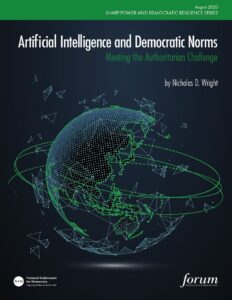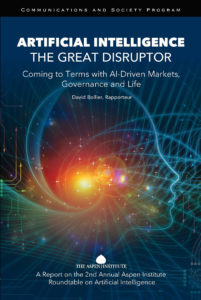De-risking authoritarian AI | Simeon Gilding | https://t.co/T0qKTpEa4Z via @aspi_org
— Democracy Digest (@demdigest) August 1, 2023
You may not be interested in artificial intelligence, but it is interested in you, says ASPI analyst Simeon Gilding.
It’s unsurprising that moves are afoot across democracies to regulate AI’s impact on our individual rights and economic security, notably in the European Union, he writes. But if we’re wary about AI, we should be even more circumspect about AI-enabled products and services from authoritarian countries that share neither our values nor our interests.
 AI technology’s potential effects on democracy at a time when online misinformation is already looming is a growing concern for the White House. President Joseph Biden himself has voiced particular concern over the technology’s implications for foreign policy and national security, but he is skeptical of tech firms’ ability to address such threats, The Wall Street Journal reports:
AI technology’s potential effects on democracy at a time when online misinformation is already looming is a growing concern for the White House. President Joseph Biden himself has voiced particular concern over the technology’s implications for foreign policy and national security, but he is skeptical of tech firms’ ability to address such threats, The Wall Street Journal reports:
That skepticism was on display when Biden convened civic leaders at the Fairmont in San Francisco for a discussion on AI last month. When attendee Tristan Harris introduced himself as the CEO of the Center for Humane Technology, the president joked, “Is that an oxymoron?”
It is challenging to predict the effectiveness of new technologies in undermining democracy. In many cases, using technology to counter the negative impacts of technology might be our best solution, says Stanford’s Francis Fukuyama, Senior Fellow and director of the Ford Dorsey Master’s in International Policy program at Stanford University’s Freeman Spogli Institute for International Studies.
There are two clear challenges that the current generation of artificial intelligence poses for democracy, he tells Mathilde Fasting, a project manager and fellow at Civita, a Norwegian think tank dedicated to liberal ideas, institutions, and policies:
-

Aspen Institute
Firstly, there is the general dissolution of our certainty about the information we receive. Deep fakes make it difficult to determine the authenticity of anything we see on the Internet. However, there are AI-based authentication technologies that can be used to certify the provenance of a particular digital artifact. Regulation needs to catch up with technology because once we recognize the general problem of mistrust, we need technological means to verify the authenticity of digital content. The solution is not to ban the technology but to use it for control and verification.
- The second challenge is an intensification of what already exists. Social media has been effective at manipulating people through targeted advertising. With artificial intelligence, targeting can become smarter and more adaptive. Once people realize they are being targeted, the manipulation can change automatically by machines, which poses difficulties in detection….
Authoritarian regimes are embarking on a sophisticated global effort to corrupt and destabilize democracies elsewhere, turbo-charged by technology, says Damon Wilson, President & CEO of the National Endowment for Democracy (NED).

Aspen Institute
Without focusing explicitly on the potential for AI to improve democracy – or at least do no harm – it will most probably corrupt, argues Polly Curtis, chief executive of the cross-party thinktank Demos. Distrusted information will proliferate, further eroding trust. But without explicitly updating our democracy to encompass more participatory activities that could be facilitated through these technologies, we will increasingly be left in a system that is centuries out of date, trying to govern in a world that moves at completely different speeds and in completely different ways, she writes for The Guardian.
There’s a broad consensus among economists that the rise of a whole class of information technologies has increased socioeconomic inequality in most advanced democracies, adds Fukuyama, author of Our Post-Human Future: Consequences of the Biotechnology Revolution. People who vote for populist politicians are usually less educated people. They don’t live in big cities, they are not connected to a kind of larger global economy, and that is upsetting our democratic politics.







